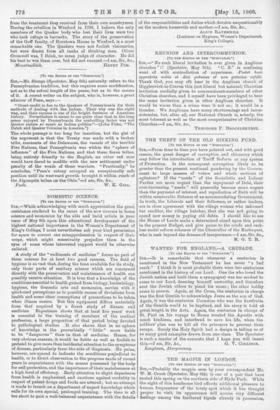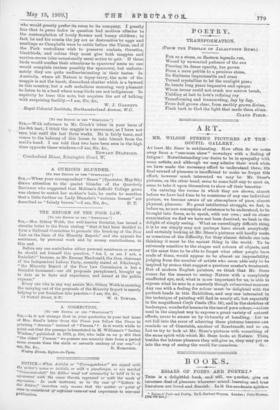THE MAGPIE IN 1,010014.
ITO THE EDITOR OF TIME “srRoverott.") Sin,—Probably the magpie seen by your correspondent Mr. W. M. Crook (Spectator, May 8th) is one of a pair that have nested this spring on the northern side of Hyde Park. While the sight of this handsome bird affords additional pleasure to human frequenters of the lovely spot which it has thought proper to visit, its appearance will arouse very different feelings among the feathered bipeds already in possession, who would greatly prefer its room to its company. I greatly fear that la gas= ladra in question bad motives ulterior to the contemplation of lovely flowers and bonny children; in fact, he and his cousin the jay are as destructive to eggs and nestlings as Campbells were to cattle before the Union, and if the Park custodians wish to preserve cushats, throstles, blackbirds, and robins they must give both magpies and carrion-crows (also occasionally seen) notice to quit. If these birds would confine their attentions to sparrows' nests no one would complain (unless possibly the sparrows), but unfortu.. nately they are quite undiscriminating in their tastes. In Australia, where all Nature is topsy-turvy, the note of the magpie is not the harsh, discordant chatter which is a byword. in this country, but a soft melodious crooning, very pleasant to listen to in a land where song-birds are not indigenous. In captivity he loses this note, but acquires the art of talking with surprising facility.—I am, Sir, &c., W. J. GARNETT. .Royal Colonial Institute, Northumberland Avenue, W.C. W. J. GARNETT. .Royal Colonial Institute, Northumberland Avenue, W.C.











































 Previous page
Previous page